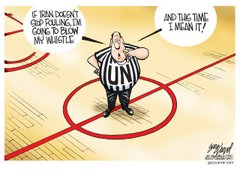Wars and Choice
Pundits like to tell us that the defining issue of the 2008 Presidential Election is going to be Iraq. Americans are going to have to make a choice between one party which wants to stop the war and the other that wants to win it.
Sen. Hillary Clinton, who originally voted to authorize the use of military force in Iraq, now says she didn't really mean it and promises to put a half to the proceedings in Iraq if she becomes our President. Sen. Barack Obama's only real claim thus far in the race has been that he'll end the war as soon as he's President. Congressman John Murtha has been blunt about the fact that he's putting legislation out there that's going to limit reinforcements, replacements, funding and support in general. Sen. Carl Levin says he wants to re-do the authorization and limit the President's ability to prosecute the war. Every Democrat has a plan, sponsors legislation, or promises their constituents that they're going to find a way to stop the war. Notice they said nothing about winning it.
On the GOP side of the aisle, President Bush resists time tables for withdrawal, because, he says, the troops will be brought home when Iraq can 'defend itself, sustain itself and support itself.'. None of the leading Republican Presidential contenders, not Rudy Giuliani, John McCain or Mitt Romney, advocate for pulling out of Iraq until we've won the day.
To many, stopping the war seems pretty humane. After all, who likes war anyways? However, it's important to apply these divergent political philosophies to other fields of endeavor.
In 1958, the worst team in the NFL won one game. The next year, the Green Bay Packers hired a guy named Vince Lombardi. He wasn't ever a head coach. The team was a loser every year and no one thought they had a chance. Lombardi was a leader though. Famous for his single-minded focus and dedication from the players he coached, leaving us with such memorable quotes as "Winning isn't everything-it's the only ting." Lombardi said that if his players followed his direction, played by his rules, he'd turn them into the stuff champions were made of. That December, the Packers hammered the New York Giants 37-0 to become NFL Champions. The Packers would win five championships in seven years, including the first two Super Bowl Championships.
For whatever reason, I can't imagine Lombardi sitting around with his team and going "Guys, I know we're a touchdown behind. We've got a lot of injuries and the fans aren't too confident in us. I think it's time to pack it in and head home".
In 1960, President Kennedy said "I believe this nation should dedicate itself, before the decade is out, to landing a man on the moon and returning him safely to the Earth." Thus, the space race was born. The Russians shot a satellite into orbit and also put the first man into space. They had better rockets, a program bolstered by slave labor and captured German scientists compelled to work on Soviet space craft. Our rockets more or less sucked and the Apollo program began with three astronauts dying thanks to a fire on the launch pad. On July 20, 1969, we landed on the moon.
I don't recall President Kennedy ever saying; "We’re never going to beat the Russians to the moon. It’s costing too much money, too many lives. Let’s stop all this nonsense."
In 1901, Teddy Roosevelt though a canal across the Isthmus of Panama would be a great idea. So he just sort of did it. "No Single material work which remains to be undertaken on this continent is of such consequence to the American people." The French worked on the thing for over a decade and managed to haul a supposed 76 million cubic yards of dirt and spent a billion and a half francs and lost 20,000 cheese-eating surrender monkeys to boot, and failed. The American effort dwarfed the French attempt. Railroads, towns and dams were constructed. Rivers and Mountains were literally moved. Diseases like malaria and yellow fever were overcome and $400 million (imagine that in today's money) was spent and plenty of lives were lost.
Despite all that, I have a hard time thinking that a challenger to Roosevelt could have come out and said at the height of this whole project that "You know what? This is too Hard. The mountains are way too big and the diseases are nasty. This isn't worth it. I promise you we'll abandon the Panama Canal before it goes any further!". Not exactly a battle cry for a nation is it?
The Moral of the story? Any effort that we take to overcome adversity is difficult. The harder it gets, the easier it is to give up.
Right now, we're trying to bring freedom to Iraq. We're trying to help install a form of government to a people who risk their lives to vote in a free election. We fight to turn a nation that once marched at the orders of a brutal dictator into a beacon of hope in an area where there isn't much. We got rid of him and his own people tried and sentenced him. We're opposed by factions inside the country and enemies that are leaking into it's boarders.
In all reality, there's no guarantee that we're going to succeed in Iraq. There's no real clear path to victory and the obstacles we face are gigantic. We're going to lose a lot of blood and a lot of money doing it. And like many other times in our history, we've got two choices.
Or, We can quit. We can take counsel of our fears and rationalize our capitulation. there are thousands of excuses available to abandon our efforts. We just need to pick one. Those that believe that peace is achieved by acquiescing to dictators and appeasing tyrants would celebrate our forsaking of this cause.
Whether we like it or not, Iraq is the central battlefield in the War Against Terrorism. There's no other way to put it. We're going to fight this war, whether we want to or not, whether it takes place there or here. The only choice we can make is between the leaders we're going to follow. There are those who want to give up and those who want to strive for victory.
Lombardi hated quitters. He said one time, "I firmly believe that any man's finest hour, his greatest fulfillment of all he holds dear, is the moment when he has worked his heart out in a good cause and lies exhausted on the field of battle - Victorious."
As candidates and voters alike approach the Presidential circus, we should all take heed and consider that. : The path of least resistance always beckons, but it is never the course a leader takes.
















No comments:
Post a Comment